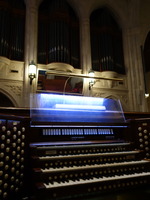Picture it: the Jongen Sonata Éroïca, the Reubke Psalm 94, and the Brahms Variations and Fugue on a Theme by Handel transcribed from the piano by Rachel Laurin, all recorded on an organ similar to – or at least suitable for – what those composers might have known. But in HOUSTON, not in Europe. Such was my second recording project for summer 2015. [The first was two Widor Symphonies recorded at St. Mark’s Cathedral in Shreveport, La., narrated here.]
Summer 2015 will go down as the very busiest of my life so far. Four recitals, three conferences, two recordings, a studio recital on the road, and only two brief vacation periods. When I agreed/planned to do all this, I did so with a strange confidence that had not been present in the past. It all just felt good, and I’m glad I did it all. (And nothing was double-booked!) Apart from the professional thrills of the performances, I believe having not one but two recordings in the hopper for future release might be one of the smartest things I have done as a professional. Now I can record every year and stay one recording ahead. [Update: our next project next spring might be some Howells on a “Perriola,” Roy Perry’s pet name for his Aeolian-Skinner installations. Stay tuned.]
This was a rewarding project, but it was also a difficult project, for reasons I’ll explain below. Nevertheless, each time I record, it gets less stressful. For that, I credit producer Keith Weber, whose laidback approach and understanding of the [imperfect] human condition make this fellow in the spotlight relax more and more. Keith's talents as a producer are just now coming to light to me, and I am more pleased all the time. He also has what he calls “the secret weapon,” which is the formidable engineering and editing talents of Ryan Edwards and Shannon Smith of Houston. The three of them are quite a team.
The other two major players for this project were page turner and registrant Kirk M. Rich, doctoral student of Robert Bates at the University of Houston, and the rather arresting Paul Fritts Op. 29 at St. Philip Presbyterian Church in Houston.
I knew what I wanted to record, and I knew where I wanted to record it. Keith went to work to arrange the location, but delays and some disorganization at our first-choice venue eventually forced us to walk away for now. (The good news is that we will be able to go back for a future project.) As Keith and I began casting about for other venues, the Fritts at St. Philip came up, and both of us paused for a moment on the phone while the light bulbs went off above our heads. OF COURSE! Perfect choice. Keith got right on the phone with Dr. Thomas Goetz and Dr. Matthew Dirst at St. Philip, and we were off and running. St. Philip was not our first choice, but it was the best choice and the right choice, no doubt. Just as St. Mark’s in Shreveport was perfect for Widor, so was St. Philip in Houston perfect for Jongen, Brahms, and Reubke.
St. Philip Presbyterian and I are no strangers. I was their organist from 1995-1997, on the previous organ in the un-renovated building. It is by far the smartest and most affirming congregation I have ever worked for. What a pleasure in 2015 to sit in that beautifully renovated space, capturing the first solo recording on that nearly-new organ, enjoying the gracious hospitality of Tom Goetz and Matthew Dirst and the professional guidance of Keith, Ryan, Shannon, and Kirk. I am a better person for it, just as I became a little better for having served that church all those years ago. The only way this could get even better would be if Tom and Matthew were pleased with the result when the CD is released next summer.
-------------------
The corner of the church sits about fifteen feet from a six-lane surface street through one of the most over-developed areas of Houston. Finding quiet time was going to be a challenge. We conquered that challenge by scheduling three consecutive evening sessions, July 20-22, from 9 pm to 2 am. With that plan, it wasn’t difficult to decide to ask fellow night owl Melissa Givens to house me those few days. I practiced Saturday and Sunday, July 18-19, met with Kirk on Sunday to go over some registrations and page turns, and then went into rest mode. Melissa and I gallivanted during the days, I napped in the afternoons, and then recording began each night.
We "knocked out" Jongen the first night and got started on Reubke. We finished Reubke the second night and got a quick start on Brahms, whom we then finished off the third night. I believe we were all surprised that it took pretty much all the budgeted time to complete the project. We were working against a few mechanical and musical issues, but we prevailed. Apparently, the church is still at battle with the HVAC system for the renovated space, and the humidity had climbed just enough to start wreaking a bit of havoc in the organ. (Conquering 98-degree weather in Houston is one thing, but 90+% humidity on top of that requires some rather heavy-duty machinery to manage.) The box had a horrible squeak when closing, there was a very mild cipher on the TONIC note (of all things) of Brahms, and some of the pallets were wheezing a bit during quieter moments. Some other issues normal for Matthew but which I had to get used to were short pedal keys, a flat pedalboard, short manual keys, a feather-light suspended action, 58-note manuals (Brahms needed 59!), and a music rack that was too small for the paste-up boards I had made for the project.
In spite of all that, it is a beautiful thing how the human body can adapt and adjust to an unfamiliar instrument, but it is equally enlightening just how manageable this music is on a non-radiating/concave pedalboard – after all, these composers had pedalboards like that! This was the perfect organ for the perfect set of repertoire. The feather-light manual action was easily solved in many cases by adding a coupler for increased resistance and fewer cracks. As for the music rack issues, Kirk saved the day with page turning. He also helped out with some troublesome piston punchings. We even toyed with having him play a few notes in one spot that didn’t want to “clean up” under my fingers, but we made it through without it, after all.
Well, then there were the musical issues. I have to hand it to Keith. He pulled some good playing out of me. It wasn’t that I played poorly, but the time was right for me to re-discover some phrasing techniques that had apparently been pushed a little (only slightly) to the side over the years. Had Keith been less of a producer, we might have been finished in two days, not three; but the project would have suffered in the end. Keith knew me and knew my work, and he knew that he could push me into higher levels of excellence, and for that I am grateful.
The organ will speak for itself on the recording, but it is a veritable masterpiece of voicing and specification. Each division has its own plenum and reeds, and generous ones, at that. As with organs of this style, you have to conserve wind by removing flutes as you build up to full organ. You can get a rather arresting full organ by omitting all flutes and even a few of the principal stops (don’t tell!), allowing the reeds and mixtures to work their magic. I even threw in the Cornet in a few climax moments. But if you ask me, the real gem of this organ is the Pedal Posaune, which is rich enough so as not to require the 16-foot flues with it. It is absolutely thrilling to hear this stop “do its thing” in the ensemble. The voicing of the organ is beautiful, but the winding shows real genius.
Keith, Ryan, and Shannon have been most gracious in their commendation of my work ethic. Apparently, they’re not used to working with people who have actually practiced and are actually ready to record. Although there were some real challenges to get right in some places, apparently these guys have to do less editing with me than with others. I am grateful to them for their professionalism and kindness, as well as to Clyde Holloway, who passed his work ethic on to me.
This was a good and worthwhile project that fed my soul on many levels. I hope that Tom and Matthew and the St. Philippians will be as pleased with this finished product as I am thrilled to have conceived of it and worked on it.
 Friday, November 13, 2015 at 9:00AM
Friday, November 13, 2015 at 9:00AM 


